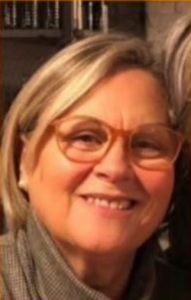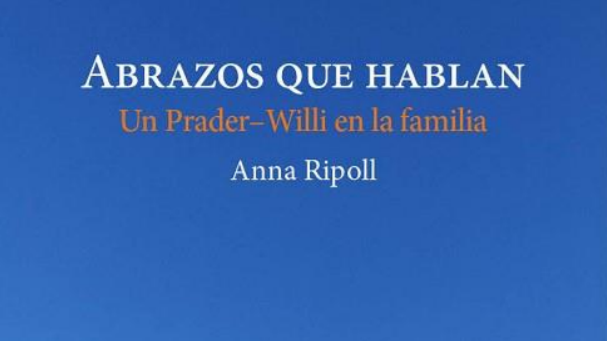Abrazos que hablan. Un Prader-Willi en la familia, escrito por Anna Ripoll, asigna todos los beneficios a la Asociación Catalana SPW para la investigación del síndrome
El primer trabajo de Anna Ripoll, expresidenta de la Asociación Catalana SPW, explica la vida de su hijo Edu, afectado por el síndrome. La obra se puede adquirir en la librería Documenta de Barcelona, en la tienda física y online.
 La Asociación Catalana del Síndrome de Prader-Willi presenta la primera obra de Anna Ripoll: Abrazos que hablan. Un Prader-Willi en familia. El libro explica la vida de Edu, un chico con una enfermedad minoritaria llamada Síndrome de Prader-Willi (SPW), causada por la pérdida de un fragmento del cromosoma 15 que causa alteraciones en el comportamiento y los hábitos alimentarios. Edu no sólo debe coexistir con el síndrome, sino con todos los prejuicios de la sociedad que lo rodea. Anna, su madre, junto con otros familiares han expresado la realidad de la enfermedad a través de sus experiencias personales en este libro que se puede comprar en la Documenta de Barcelona. Y lo más importante, todos los beneficios se destinarán a la Asociación Catalana SPW para la investigación del síndrome que lleva a cabo el Hospital Universitari Parc Taulí de Sabadell (Barcelona).
La Asociación Catalana del Síndrome de Prader-Willi presenta la primera obra de Anna Ripoll: Abrazos que hablan. Un Prader-Willi en familia. El libro explica la vida de Edu, un chico con una enfermedad minoritaria llamada Síndrome de Prader-Willi (SPW), causada por la pérdida de un fragmento del cromosoma 15 que causa alteraciones en el comportamiento y los hábitos alimentarios. Edu no sólo debe coexistir con el síndrome, sino con todos los prejuicios de la sociedad que lo rodea. Anna, su madre, junto con otros familiares han expresado la realidad de la enfermedad a través de sus experiencias personales en este libro que se puede comprar en la Documenta de Barcelona. Y lo más importante, todos los beneficios se destinarán a la Asociación Catalana SPW para la investigación del síndrome que lleva a cabo el Hospital Universitari Parc Taulí de Sabadell (Barcelona).
La vida de Anna hizo un giro de 180 grados cuando nació su hijo Edu, un chico entusiasta y luchador que sufre el síndrome de Prader-Willi. Desde ese momento Anna se volcó en la vida de su hijo y a todas las familias que se encuentran en la misma situación, convirtiéndose en la presidenta de la Asociación Catalana de Síndrome de Prader-Willi entre 2001 y 2015, delegada en Cataluña de la Federación Española de Enfermedades Raras entre 2010 y 2016 de la que actualmente sigue siendo miembro su junta directiva.
El libro comienza con un discurso de Edu en el Congreso Nacional de Enfermedades Raras 2015, como testimonio de la mesa “Vivir con una Enfermedad Rara”. Basándose en esta visión, el libro desarrolla los puntos de vista de Anna, la madre; Albert, el hermano; y Julio, el padre.
Este trabajo es un paso más en la lucha por la visibilidad de este síndrome, mostrando la vida cotidiana de una familia con Prader-Willi a partir de las experiencias de diferentes miembros de la familia, y algunos profesionales. El libro está dirigido principalmente a familias en la misma situación, aunque es una gran oportunidad para entender una enfermedad desconocida para la sociedad.
“… el problema no era solamente la patología en sí, si no la incomprensión de la misma por parte de la sociedad en general, y por las personas de nuestro entorno en particular.”
Esta frase de Anna define el comportamiento de la sociedad hacia el SPW y otras enfermedades cognitivo-conductuales. Las enfermedades con afectación físicas son generalmente más aceptadas que las enfermedades mentales, donde los síntomas se confunden con meros problemas de conducta asociados con la educación.
Abrazos que hablan invita a la reflexión y abre los ojos al lector a través de la mirada de una familia que ha estado dispuesta a cambiar totalmente su vida por el bienestar de Edu. La historia de esta familia, la publicación del libro y la destinación de los beneficios para la investigación nos llevan a describir la pieza con una sola palabra, generosidad.
Hugs that speak. A person with Prader-Willi in the family, written by Anna Ripoll, all proceeds going to the Catalan Association SPW for the investigation of the syndrome
The first work of Anna Ripoll, former president of the Catalan Association SPW, explains how the life of her son Edu was affected by the syndrome. The work can be purchased at the Documenta bookstore in Barcelona, in the physical and online store.
The Catalan Prader-Willi Syndrome Association presents Anna Ripoll’s first work: Hugs that speak. A person with Prader-Willi in the family. The book explains the life of Edu, a boy with a rare disease called Prader-Willi syndrome (PWS), caused by the loss of a fragment of chromosome 15 that causes alterations in behaviour and eating habits. Edu must not only coexist with the syndrome, but with all the prejudices of the society that surrounds him. Anna, his mother, along with other family members have expressed the reality of the disease through their personal experiences in this book that can be purchased at Documenta de Barcelona. And most importantly, all the profits will go to the Catalan Association SPW for the investigation of the syndrome carried out by the Hospital Universitari Parc Taulí de Sabadell (Barcelona).
Anna’s life took a 180-degree turn when her son Edu was born, an enthusiastic and feisty boy with Prader-Willi syndrome. From that moment, Anna devoted herself to the life of her son and to all the families that are in the same situation, becoming the president of the Catalan Association of Prader-Willi Syndrome between 2001 and 2015, and delegate in Catalonia of the Spanish Federation of Rare Diseases between 2010 and 2016, of which its board of directors are still a member.
The book begins with a speech by Edu at the 2015 National Congress of Rare Diseases, as testimony representing “Living with a Rare Disease”. Based on this vision, the book develops the views of Anna, the mother; Albert, the brother; and Julio, the father.
This work is one more step in the fight for the visibility of this syndrome, showing the daily life of a family with Prader-Willi from the experiences of different family members, and some professionals. The book is directed mainly at families in the same situation, although it is a great opportunity to understand a disease unknown to society.
“… the problem was not only the pathology itself, but the misunderstanding of it by society in general, and by people around us in particular.”
This phrase from Anna defines the behaviour of society towards PWS and other cognitive-behavioural diseases. Diseases with physical involvement are generally more accepted than mental illness, where symptoms can be mistaken for mere behavioural problems associated with education.
Talking hugs invites reflection and opens the reader’s eyes through the gaze of a family that has been willing to totally change their life for the well-being of Edu. The history of this family, the publication of the book and the destination of the research benefits lead us to describe the piece with a single word, generosity.

